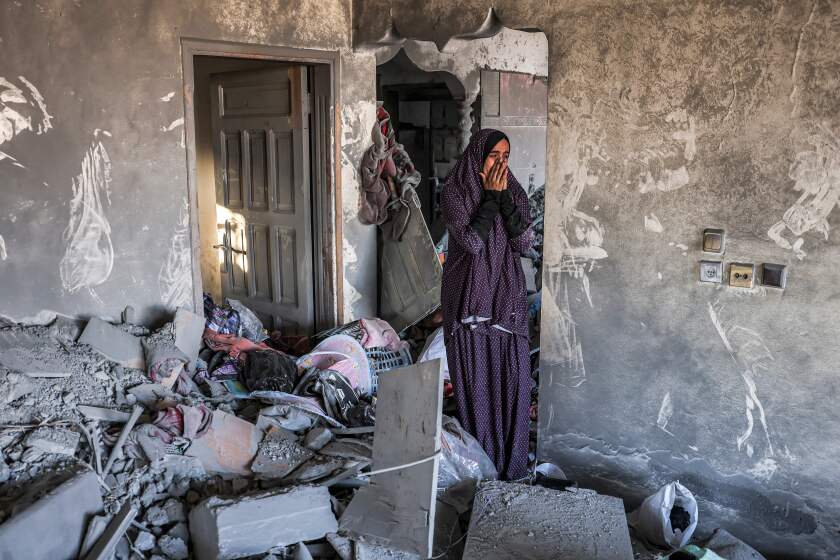Opinion: Here are seven ways the U.S. can push Israel toward a cease-fire in Gaza

- Share via
At least 13,000 people have died in Gaza during Israel’s current operation. On Nov. 20, United Nations Secretary-General António Guterres described the killing of civilians there as “unparalleled and unprecedented in any conflict” of his tenure.
The United States has provided much of the bombs, shells and ammunition causing these deaths. I resigned from the State Department bureau responsible for these transfers a month ago, when it became obvious what would unfold in Gaza, absent a change in policy, for which there was no appetite.
Israel’s quest to root out Hamas has inflicted indiscriminate death and destruction on Gaza and Palestinian civilians. Humanitarian pauses are no longer enough.
The current truce has been an important step, allowing for the exchange of hostages and distribution of humanitarian relief. But it’s set to end Thursday, and Israeli Defense Minister Yoav Gallant has warned his troops to be ready for another two months of heavy fighting.
Meanwhile, U.S. support for an unachievable Israeli set of military objectives in Gaza remains unchanged, but as global calls for a cease-fire grow, it is well past time for the U.S. government to join in. But how?
Imagining possible futures beyond Israel’s Jewish supremacy is a political act for me, rooted in my people’s history.
Through its “iron-clad” commitment to Israel’s security, the U.S. has a broad set of levers over Israeli defense policymaking. It’s also in a position to offer incentives for a cease-fire. Here are seven ways the U.S. could help push Israel toward a cease-fire without undermining Israel’s basic national security:
- The U.S. provides more than $3.8 billion to Israel annually in military grant assistance. The Biden administration has vowed to never apply conditions on this assistance, which comes from funding appropriated by Congress. But all foreign aid comes with conditions. There is space within existing laws and policies to prevent U.S. arms from being provided to units credibly implicated in gross violations of human rights, or from being used to cause vast civilian casualties. We should hold ourselves to those laws and policies for Israel as we do for other partners.
Call a war crime a war crime, regardless of whether you support the perpetrator’s cause.
- The annual Appropriations Act frequently applies conditions to countries that receive U.S. military grant assistance (i.e., U.S. taxpayer funding for military equipment). As Congress considers Biden’s emergency supplemental request for military aid, lawmakers could, in theory, add similar conditions to aid for Israel. That could include no funding for lethal arms being made available until a cease-fire is in effect and adequate humanitarian relief mechanisms have been established. Sen. Bernie Sanders (I-Vt.) has recently proposed such an approach. Absent congressional action, the administration could by itself rescind the agreement that lets Israel’s military grant assistance accrue interest in the Federal Reserve Bank of New York — interest that Israel has used to pay down its debt to the U.S.
- As the major supplier of Israel’s arms, the U.S. could also ration the flow of key weapons to Israel, which is currently burning through vast amounts of air-to-ground munitions and artillery shells. It could do so by limiting Israel’s ability to draw from the war reserve stockpile the U.S. holds in Israel — perhaps limiting release of such arms to a case-by-case justification. The U.S. could also withhold approvals or delay shipments of arms that Israel has requested through the regular foreign military and direct commercial sales processes managed by the State Department. (In 2021, Biden took this step with the Saudi Arabia-led coalition fighting in Yemen by suspending arms transfers, as the president said, “This war has to end.”) Congress could also act here by removing Israel from the NATO+5 list of countries eligible for expedited consideration of arms sales.
Israel’s war with Hamas in Gaza renews my sense of dispossession as a Jordanian-Palestinian American. I feel both lucky and guilty to be far from the fighting.
- U.S. diplomacy provides a shield for Israel in the Middle East. U.S. efforts in the region have focused on integration of Israel into the Arab world. There are increasing calls across the region, including from Saudi Arabia, that before normalizing ties with Israel, the Israeli-Palestinian peace process must succeed. The U.S. should endorse those calls as well as provide diplomatic support to the calls of Arab leaders and the Organization of the Islamic Cooperation, for a cease-fire. That, combined with increased U.S. abstentions in U.N. votes raising concerns about Israeli actions in the Occupied Territories, might convince Israel that absent moves toward a cease-fire, the diplomatic cover it needs to succeed in other regional endeavors will fade.
- The U.S. could signal that if there’s no cease-fire it will employ the approach it has taken to Ukraine’s efforts to bring Russia to account for war crimes. The U.S. is currently not facilitating the work of the International Criminal Court on that issue, but also not obstructing it. Israeli officials may choose to change course if the U.S. makes it clear that there will be consequences for their continued bombardment in Gaza, including the potential to hold Israeli military decision makers and armed forces accountable for their actions. The risk here, of course, is that the U.S. itself may be implicated in any potential war crimes because it provides weaponry to Israel.
- The U.S. already has a military-to-military dialogue with Israel. Within that, American defense officials could underline the long-term cost of Israel’s current approach in Gaza and the threat it poses to Israel’s defenses, in terms of both the stability of the West Bank and the willingness of Arab partners to continue to work with it. (This will depend on how much Israel’s operations are being planned and driven by the Israeli military, as there is good reason to believe that a part of the rationale for the campaign has more to do with holding Prime Minister Benjamin Netanyahu’s governing coalition together than it does with military strategy.) Through those channels, the U.S. has the ability both to provide trusted advice to multiple levels of the Israel Defense Forces and to express, in a less public context, significant displeasure with Israel’s actions. Words to this effect could be backed up by canceling or postponing certain engagements, such as military exercises.
- Other diplomatic steps the U.S. could take to press Israel more indirectly for a cease-fire could include rescinding the program that allows Israeli citizens to enter the U.S. without a visa. The administration rolled out this visa waiver program in September. Biden could also announce a policy review over whether to maintain the Trump administration’s recognition of Israel’s unilateral annexation of the Golan Heights. Such steps would send the message that Israel’s continued prosecution of the war in the current manner would not be without consequence to the bilateral relationship.
Any of these routes would require something that has been in short supply in Washington recently — political courage. Only about 45 members of Congress, including two senators, have called for a cease-fire. But the tide is turning, and it only seems a question of how many Palestinian deaths it will take for a critical mass in Congress to advocate for a cease-fire. The levers are there for the U.S. to pressure Israel to end this bloody and pointless war — if only it is willing to use them.
Josh Paul was, until recently, a director in the State Department’s Bureau of Political-Military Affairs, which is responsible for U.S. arms transfers.
More to Read
A cure for the common opinion
Get thought-provoking perspectives with our weekly newsletter.
You may occasionally receive promotional content from the Los Angeles Times.














